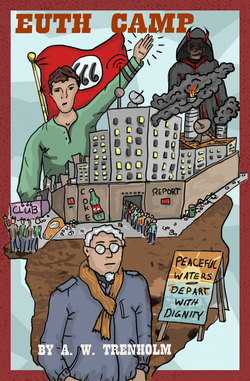Читать книгу Euth Camp - A.W. Trenholm - Страница 14
На сайте Литреса книга снята с продажи.
Оглавление9. Ms. Sussex
The fancy name of my dwelling, Melton Manor, did nothing to make the long climb up the old twisting stairs to my fourth-floor apartment any easier. The elevator had long since stopped working, and was now used for storage by Ms. Edna Sussex, our apartment manager. I was hoping that I might slip quietly by her apartment door unnoticed. No such luck! I was hardly past when her door flew open and she poked her head out.
“Oh, it is you! I thought so by the way you sneak around come rent time. I see you got a ‘Please report to your Citizens’ Wellbeing Office’ reminder on the e-bulletin board this morning. Can I assume you will finally accept reality, do what is right and turn over your apartment cards early? You can always donate your bonus credits for an early retirement to the Pet Loan Society, of which I am the local president.”
Around her feet were a number of cats, presumably in line to be loaned out for a price. Her apartment always had the unpleasant smell that too many cats living in close quarters can produce. Owning a pet had long since become so expensive that few but the very rich could afford to have one, or have the facilities to protect them from the hungry population, in spite of the fact that it was a capital offence for anyone to kill a pet for food. The Animal Rights Laws had become more punitive than human law.
Self-absorbed Edna always assumed a position of moral superiority in any conversation. Without hesitation or hint of humility, she boldly presented herself as the fount of all that was right and good, and was a self-appointed judge of all that she considered wrong. She lived in a two-dimensional cocoon-like world of her own making. According to her fixed view of things, I was an anomaly, a potential threat to myself and others, and most importantly, a danger to society. Edna felt that my “free spirit” needed to be held firmly in check—which she tried to do by the sheer force of her own all-controlling presence. I seldom contested the socially subordinate orbit that she automatically assigned to me, preferring to leave her views unchallenged, and I hardly ever openly confronted her. However, this day I did not feel inclined to let her obfuscated commentary on my life go without objection.
“Edna Sussex,” I replied, punctuating my point with the happiest smile I could muster, “I feel very much alive and wonderful. I plan to live forever! As God is my salvation, I intend to outlive you, this apartment, and this world with all its insane rituals, rules, and regulations!”
My defiant buoyancy in the face of her presentation of life’s blunt and brutal reality drove her to distraction. Sputtering and spitting like an alley cat dowsed with water, she blurted out indignantly: “Mr. Fairfield, stop your blasphemous mouth! The Force is the only hope of salvation you have, and without the provisions made for you by our Global Guardian, you would be out in the street. Your invisible God won’t save you then! I should report you! You’re a nut case from the Middle Ages! Insane as they come! You’re weird!—You know that, don’t you? You need counseling! You need therapy and rehabilitation. You need help! And…you need to come up with the rent or you will be out in the streets! The Sweepers will get you, which is just what you deserve!”
Her daily exhortation over, she punctuated her final sentence by stepping back into the gloom of her apartment and slamming the door, but not before she had stepped back onto the tail of one of her furry little friends, which let out such a loud vocal protest that the dramatic effectiveness of Edna’s diatribe quickly dissipated.
The Sweepers!—What a gang of ghouls most of them were; armed thugs in City Sanitation Department uniforms, whose assigned job is to keep the streets safe and clear of any garbage, using huge sanitation containers with hydraulic scoops. They are known to have swept up the homeless and the unregistered. The government had turned a blind eye to this practice since the people who disappeared were usually the disenfranchised members of what had become an invisible class. Sweeping had become a very profitable business for any who were willing to engage in it and profit from the sale of humans—alive or dead. Many people were swept up and sold to the large government factories that used unregistered people as free laborers in slave-like conditions with little hope of escape or being free. The right to live was something granted to those compliant with state rules, and not something we could assume was a natural right for just being born.
But not all Sweepers were bad, especially the ones that unloaded in our dump. The Word had been passed on to them and they became believers. They even took us in their garbage scoops to where we needed to go, like a taxi service that transported us safely around the city right under the ever watchful eye of the state agents. Their machines bore a symbol on them that told us which ones were Christian-friendly. We couldn’t use any known or common symbol to identify a fellow believer, like a fish or a cross, so we settled on a happy face for simplicity– “☺”. The symbol was just scratched or drawn on the side of the vehicle in the collected dust that such vehicles gather.
